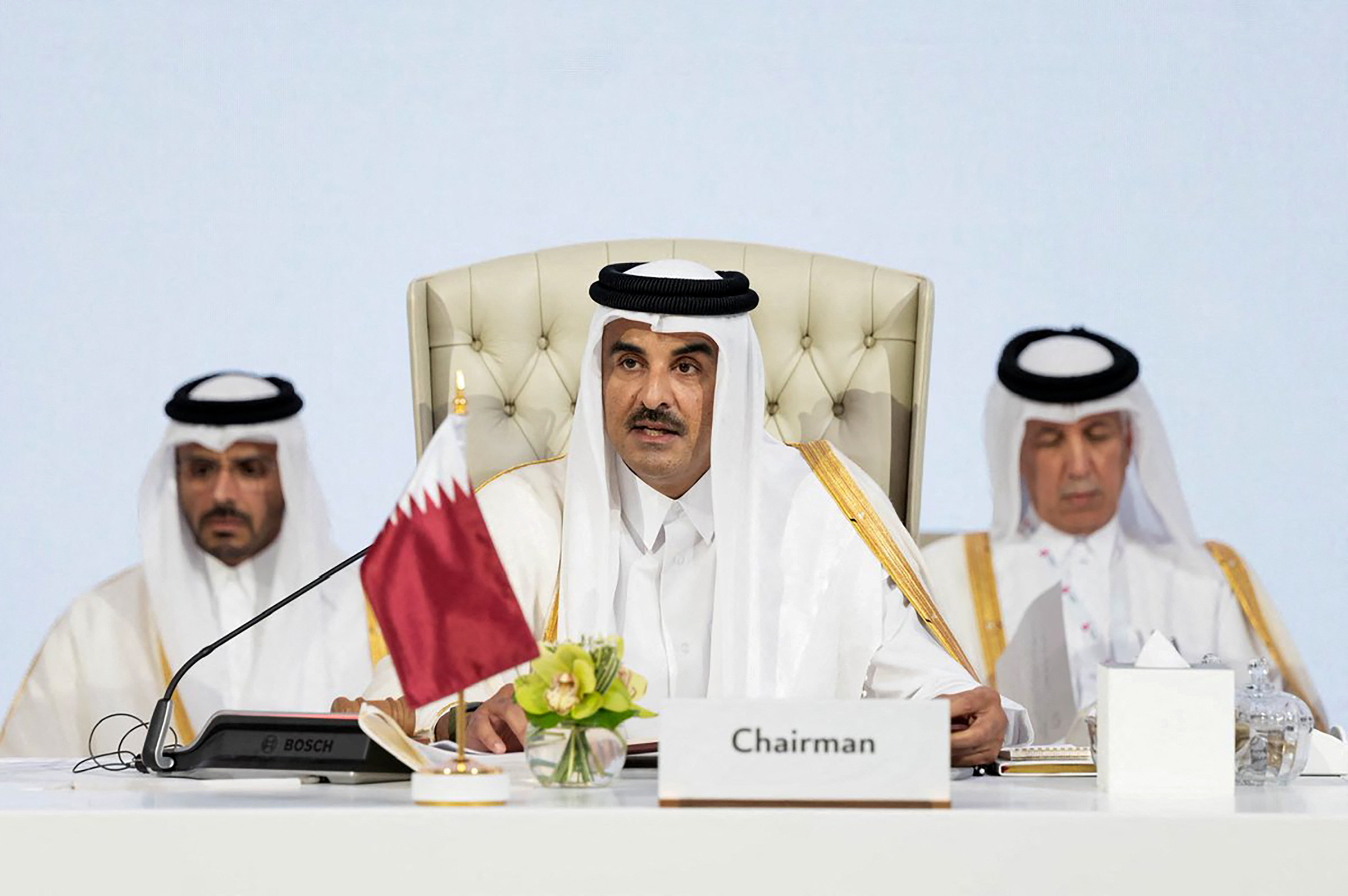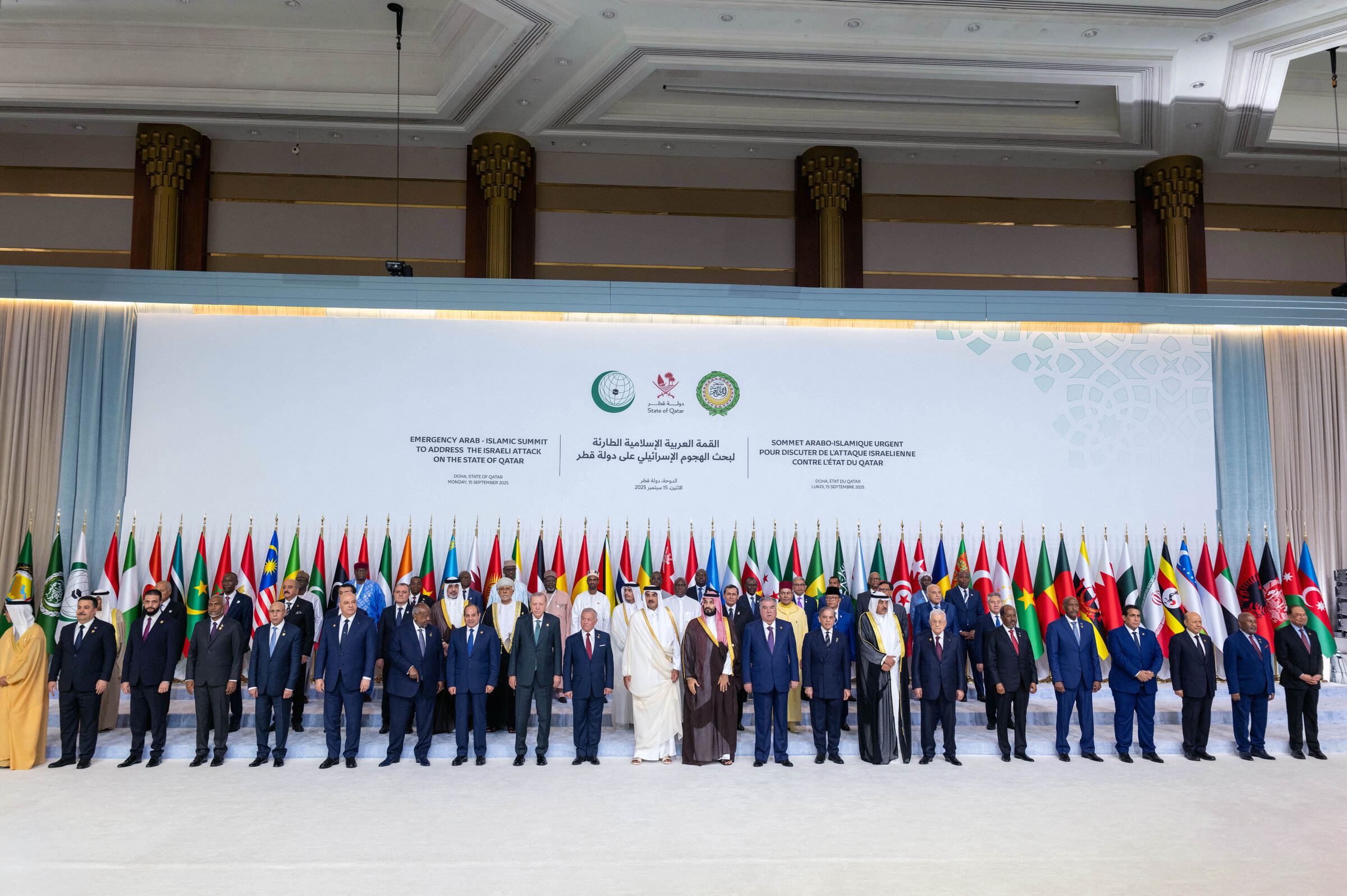On 9/9, the Israeli Air Force launched an unprecedented airstrike on Doha, Qatar, targeting a complex where senior Hamas leaders were meeting. The complex was located in a densely populated civilian area. The move shocked many, as Qatar is a sovereign nation, a US ally in the Middle East, and maintains relations with Israel.
The attack further unsettled Arab and Muslim nations in the Gulf, as Israel appears increasingly emboldened, willing to cross "red lines" to eliminate opponents, while the US has taken no concrete action to control the situation. Israel has also intensified its military campaign in Gaza, causing heavy civilian casualties despite appeals from both the Arab bloc and the international community.
The Arab League and the Organization of Islamic Cooperation (OIC) held a summit in Doha on 15/9 at Qatar's request. However, contrary to expectations of a unified and impactful response to pressure Israel, the Arab nations disagreed, resulting in only a symbolic reaction.
 |
Qatar's Emir Tamim bin Hamad Al-Thani (center) chairs the Arab-Islamic summit in Doha on 15/9. Photo: AFP |
Qatar's Emir Tamim bin Hamad Al-Thani (center) chairs the Arab-Islamic summit in Doha on 15/9. Photo: AFP
Qatar's Emir Tamim bin Hamad Al-Thani delivered a strong speech at the opening of the summit, accusing Israel of not caring about the hostages held by Hamas in Gaza, but instead seeking to make "Gaza uninhabitable."
"If Israel is so eager to kill Hamas commanders, why bother negotiating? If you care about rescuing hostages, why kill all the negotiators?", the Emir asked. He used strong language, even implying that Israel was "treacherous."
The 15/9 summit was a rare occasion with the participation of both Saudi and Iranian leaders, Crown Prince Mohammed bin Salman and President Masoud Pezeshkian, respectively. This suggests that Israel is becoming such a pressing issue that even these two regional rivals are seeking cooperation.
Pezeshkian recalled Israel's airstrike on Iran in June, warning that any country in the region could be Tel Aviv's next target. "The attack on Doha has revealed many miscalculations and skewed assessments," Pezeshkian said. "No Arab or Muslim country is safe from the aggression of the administration in Tel Aviv."
Leaders of other Arab and Muslim nations, including Iraqi Prime Minister Mohammed Shia al-Sudani, Palestinian President Mahmoud Abbas, Turkish President Tayyip Erdogan, King Abdullah II of Jordan, and Indonesian Vice President Gibran Rakabuming Raka, also condemned Israel. However, Malaysian Prime Minister Anwar Ibrahim, whose country is an OIC member, said this was not enough.
"Condemnation will not stop the missiles. Statements will not liberate Palestine," Ibrahim said. "There must be serious sanctions."
Before the summit, analysts had mentioned the possibility of Arab and Muslim nations closing their airspace to Israel or downgrading relations, putting immense pressure on Tel Aviv to reconsider its military strategy and its Gaza offensive.
But countries like Egypt, Saudi Arabia, and Turkey were reluctant to take such drastic actions. These countries have vested interests with Israel, making none of them want to publicly confront Tel Aviv.
Turkish President Recep Tayyip Erdogan agreed on sanctioning Israel after the attack on Qatar, but stressed that Gulf and Muslim countries should not be too heavy-handed. "Israel needs to be economically strangled because past experience shows that this step is effective," Erdogan said, without elaborating.
The joint statement after the event only called on the parties "to take all effective legal measures to prevent Israel from continuing its actions against the Palestinian people."
The idea of closing airspace or military options was not considered, as Qatar and the Gulf countries' strength lies in "soft power," with a clear disadvantage in "hard power" compared to Israel. Any effort to establish a NATO-like Arab military alliance is not a promising option at this time, according to observers.
The six Gulf Cooperation Council (GCC) nations—Bahrain, Kuwait, Oman, Qatar, Saudi Arabia, and the United Arab Emirates (UAE)—met separately on the sidelines of the summit. The GCC also only decided to "take steps to activate the joint defense mechanism and the Gulf's deterrent capabilities," without mentioning specific measures.
Within this council, two members, the UAE and Bahrain, joined the Abraham Accords brokered by US President Donald Trump during his first term and normalized relations with Israel. 15/9 marked five years since the UAE and Bahrain joined the accords.
"Since the Arab League has not agreed on any specific response measures, Israel will likely disregard their statements," said Abdulaziz Alghashian, a researcher at the Gulf International Forum.
"I think many people expected stronger actions. The statements were drafted to increase the weight of the tone, but in reality, nothing has fundamentally changed," he continued.
 |
Leaders of Arab and Muslim countries at the summit in Doha, Qatar on 15/9. Photo: AFP |
Leaders of Arab and Muslim countries at the summit in Doha, Qatar on 15/9. Photo: AFP
Andrea Dessi, associate professor of international relations and world politics at the University of Rome, Italy, said the Doha summit marked a shift in perspective within the Arab-Islamic bloc toward a new security structure in the region that meets their interests.
According to Dessi, Arab and Muslim countries have shown signs of rapprochement, a change in tone and thinking in the face of Israel's decisive actions, but she believes they need to put forward concrete measures.
"Despite the lack of concrete initiatives, the Doha summit still played an important role, as the Arab and Muslim bloc agreed that the regional security structure needs to change. We are still far from that goal, but shifts have begun to emerge," she told Al Jazeera.
Nhu Tam (According to Economist, AP, Al Jazeera)












